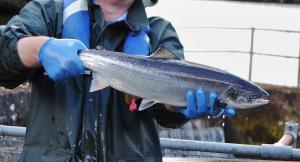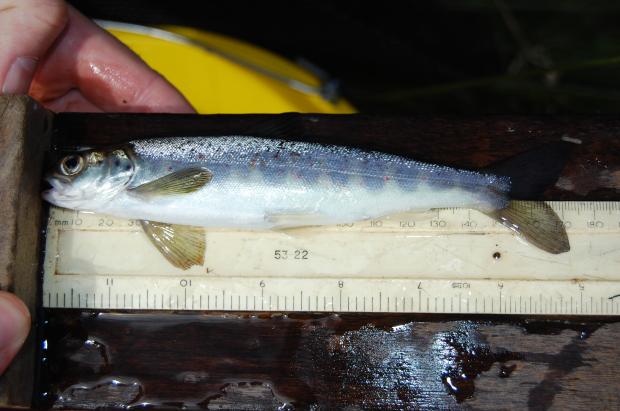Enhancing the natural and marine environment is one of the key science themes of the Agri-Food and Biosciences Institute (AFBI).

Within this theme, largely funded by the Department of Agriculture, Environment and Rural Affairs (DAERA), AFBI has an extensive programme of work focussing on aquatic life, including investigations of the sustainability of fishing both at sea and in fresh waters. This work is essential to enable AFBI to advise local, national and international policy makers in the areas of stock migration, conservation and management.
To deliver on this, AFBI’s Fisheries and Aquatic Ecosystems team have invested significantly in recent years in new technology to track individual fish in freshwater and marine systems across space and time. The data which is now being collated and analysed is providing new and detailed knowledge of fish ranging, migration and survival over critical periods of the lifespan of some key species.

Furthermore, the technology has the ability to provide information on the depth and temperature of the water and when a fish is eaten in the water by a predator Alternatively, a passive tag system, which detects fish as they pass a scanner, is also being deployed to monitor salmon as they migrate downstream to sea through the River Bush salmon station and as they return to breed a year later.
Key areas of work which these tracking systems are being used for include:
- measuring the survival of migrating salmon, sea trout and eel passing down rivers and through lakes to the marine phase of their lives; and
- tracking freshwater trout and bream in lakes and rivers, recording their annual migrations between feeding and spawning areas, when they are eaten by predators and monitoring their survival rates over time.
AFBI works extensively with international partners through the COMPASS and SeaMonitor projects, which are both assisted by EU INTERREG VA funding through the Special EU Programmes Body. These partnerships have extended AFBI’s work far beyond Northern Ireland’s freshwater systems and expanded salmon and sea trout tracking to international arrays of receivers at sea.
This internationally funded dimension has established key pathways for a number of species, i.e. the data has informed us of Eels leaving the River Bann heading west past North Donegal on their journey to the Sargasso sea breeding grounds, young salmon up to 250 km out into the Atlantic ocean from the rivers feeding into the Irish Sea, and Sea trout from Irish east Coast rivers travelling 50Km or more to use feeding areas ranging from the Boyne estuary to Strangford Lough.
Widely travelled fish clearly know no borders and these observations show the benefits of working with international and cross border partners to ensure coverage of the full ranges used by shared species. This new data allows AFBI to comprehensively advise fishery policy makers in NI, across the UK and internationally on the ranges of water area used by individual species, survival rates over time, natural and human impacts, and the need for appropriate management plans to cover critical migration pathways and the range of habitats used by each species.
Notes to editors:
AFBI is an arms-length body of DAERA delivering research and development, diagnostic and analytical testing, emergency response capability and expert scientific advice for DAERA and other government departments, public bodies and commercial companies in Northern Ireland, and further afield.
AFBI’s Vision is “Advancing the Local and Global Agri-Food Sectors Through Scientific Excellence”.
AFBI’s core areas:
- Leading improvements in the agri-food industry;
- Protecting animal, plant and human health;
- Enhancing the natural and marine environment.
Useful references
Latest news
- AFBI issues Nematodirus warning – Spring 2025 11 April 2025
- Managing Nature Based Risks to the UK Economy and Opportunities for Green Finance 08 April 2025
- AFBI Hillsborough host AERA committee 27 March 2025
- The Omics Days Conference 27 March 2025
